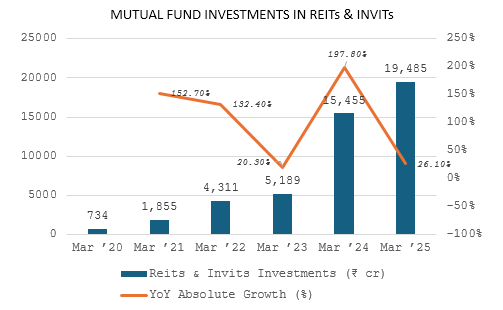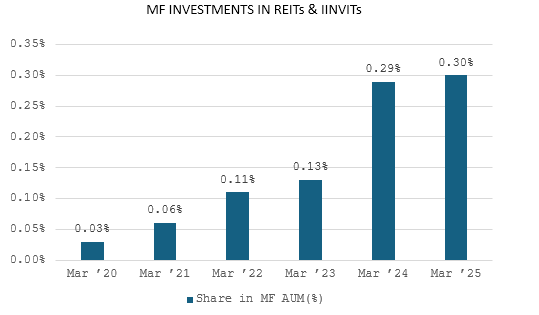



A major structural shift is underway in how institutional capital pursues yield in a maturing investment landscape. At the heart of this transformation are Real Estate Investment Trusts (REITs) and Infrastructure Investment Trusts (InvITs).
Although these instruments were introduced in India between 2014 and 2016, significant mutual fund participation only picked up in recent years. From FY20 to FY25, total capital mobilised through REITs and InvITs surged from ₹10,770 crore to a cumulative ₹1.6 trillion. Mutual fund investments alone jumped from ₹734 crore in March 2020 to nearly ₹20,000 crore by March 2025—a clear signal of changing approaches to yield generation and diversification.

Several key factors are driving this reorientation by Indian MFs:
1. A Balanced Risk-Return ProfileREITs and InvITs offer a unique middle ground between traditional debt and equity. Their cash flows, backed by real estate leases or long-term infrastructure annuities, generate higher yields than most debt products while exhibiting lower volatility than equities. In a climate of low fixed-income yields and stretched equity valuations, these instruments provide both income stability and capital appreciation.
2. Supportive Regulatory FrameworkSEBI’s progressive regulations have catalysed mutual fund participation. The allowance for funds to invest up to 10% of their AUM in these instruments—and the possibility of this limit being raised—has legitimised the asset class. The launch of the Nifty REITs & InvITs Index in 2023 further enhanced transparency by enabling performance benchmarking and risk calibration.
3. Growing Conviction Among Fund HousesAs of now, 22 of India’s ~45 asset management companies currently invest in REITs and InvITs and participation is deepening. Notably, three major MFs—SBI, ICICI Prudential, and HDFC—account for 77% of the mutual fund exposure in this space, signalling growing confidence from market leaders.
 4. A Maturing Issuance Ecosystem
4. A Maturing Issuance EcosystemThe supply side is also evolving. There are currently four listed REITs and 18 InvITs and the quality of assets coming to the market is improving further. Institutional-grade sponsors are increasingly using these structures to monetise assets, leading to better governance, transparency, and liquidity. Mutual funds are now active participants in both primary and secondary markets—often anchoring IPOs and later reallocating based on NAV and tactical positioning.
Mutual funds are agile investors, adapting portfolios dynamically between primary and secondary markets. In contrast, insurance companies and pension funds, especially those focused on AAA-rated instruments, tend to follow a buy-and-hold approach. Their preference for large blocks and private placements adds stability but contributes less to market liquidity.
Strategic Outlook: From Tactical Bet to Core AllocationRecent successful issuances with strong governance have reshaped investor perceptions. Increasingly, REITs and InvITs are seen not just as yield-generating assets but as essential components in long-term, liability-linked portfolios.
Growing MF clout:By 2030, mutual fund allocations to REITs and InvITs could exceed ₹1.5–2.0 lakh crore, powered by:
* SEBI’s anticipated easing of investment limits, expanding the scope beyond the current 10% cap.
* Rising demand for hybrid income-generating assets with embedded inflation protection.
* Broader product variety, including retail, warehousing, and renewable energy InvITs, allowing for more tailored and diversified portfolios.
ConclusionThe growing interest by MFs in REITs and InvITs marks a transition from opportunistic participation to deliberate strategic allocation. As India’s real estate and infrastructure monetisation stories scale, these instruments are becoming central to how long-term, sustainable income is generated in a post-rate-hike world.
(Vijay Agrawal, Managing Director, Equirus Capital.)Views are personal and do not represent the stand of this publication.Discover the latest Business News, Sensex, and Nifty updates. Obtain Personal Finance insights, tax queries, and expert opinions on Moneycontrol or download the Moneycontrol App to stay updated!
Find the best of Al News in one place, specially curated for you every weekend.
Stay on top of the latest tech trends and biggest startup news.